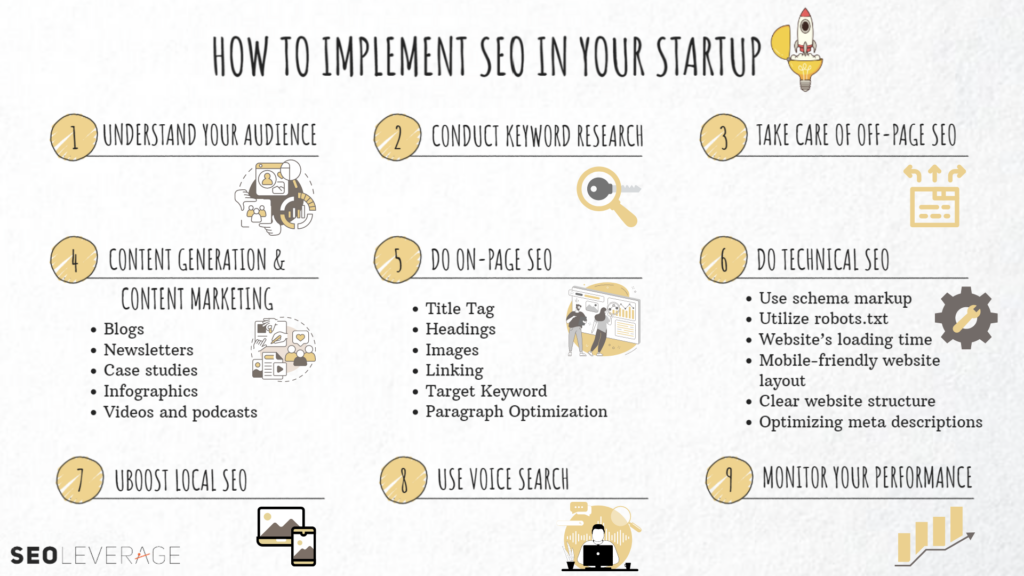Getting into a new business venture feels like starting a new chapter of your life. As a startup founder, your business should be visible online and reach the right audience in an age of digital connectivity. Search engine optimization (SEO) paves the way for your business to thrive and be known to the public.
In this article, you’ll learn:
- The definition of SEO for startups
- How to implement SEO in your website and content
- The SEO tools you will need to implement strategies
Table of Contents
Understanding SEO for Startups
SEO for startups is more than a one-off technique. It’s a detailed approach that immediately brings websites to the first ranks of search engine result pages (SERPs), beating out your competitors. Launching SEO strategies in full swing adds credibility and customers to your business. SEO gives the solutions you need to solve your problems and make way for your business to grow.
How to Implement SEO in Your Startup
Follow this detailed guide to putting SEO strategies into action:
1. Understand Your Audience
Understanding your audience is the first step that acts as the foundation of any SEO strategy. Conduct market research to know their preferences, demographics, interests, and behavior. The information from this research will guide the next steps in creating content and SEO strategy.
2. Conduct Keyword Research
Your content will need keywords to make your website visible to users. These words and phrases are the commonly used terms that users type on search bars when they look for a product or service.
Begin your keyword research with a brainstorming session on the most common topics and terms people use in your industry based on their search intent. Use tools like SEMrush and Ahrefs to find this long list of keywords. These tools can analyze each keyword's competition, search volume, and difficulty.
Use keywords that have low competition yet high in terms of search volumes. Long-tail keywords, which are longer with more specific phrases, are better for targeting a particular audience. Incorporate all your keywords seamlessly into your content, meta tags, and headings to optimize your content further.
3. Content Generation and Content Marketing
Content generation is creating content for your website. On the other hand, content marketing is distributing content to your channels for your users to consume. Content Marketing Institute said that 73% of business-to-business marketers and 70% of business-to-consumer marketers use content marketing.
Content marketing deals with the needs and interests of your audience right away. It also positions your business as a trusted source of information and improves your SEO efforts.
Consider creating these kinds of content that you can share on social media:
- Blogs: Write high-quality and informative blogs that contain relevant topics in your industry and are optimized with keywords. Have a regular publishing schedule to keep the content going.
- Newsletters: Regularly publish newspapers according to your schedule to share updates and industry trends.
- Case studies: Write in-depth studies about your industry to provide valuable insights on certain topics.
- Videos and podcasts: Create podcasts and videos regarding industry trends and offer your insights in every episode.
- Infographics: Make visually appealing infographics that simplify complex topics concisely.
Content marketing needs continuous and consistent effort since it’s an ongoing process. Keep on delivering content that pulls organic traffic and nurtures relationships with customers.
4. Do On-Page SEO
On-page SEO means optimizing your content for better outcomes at SERPs. Now that you have your content, you still need to improve it so search engines can rank it and make it visible to viewers.
These are the factors you need to consider when conducting on-page SEO:
- Target Keyword: These words help the search engine understand the topic and its relevance. Insert your target keywords in the first paragraph smoothly to make it sound natural when reading.
- Title Tag: Write a compelling title with the target keyword to get more clicks.
- Headings: Use H1 for titles and H2 and H3 for dividing the content properly.
- Paragraph Optimization: Break paragraphs into shorter ones to improve readability.
- Images: Compress your images into smaller file sizes to increase your website’s loading time.
- Linking: Put internal links that point to other pages of your site and external links that lead to another website to improve your authority online.
5. Take Care of Off-Page SEO
With off-page SEO, you can establish a solid online presence without touching any content on your site and still rank better. Write informative guest posts filled with relevant keywords. Build high-quality backlinks from top websites through link-building to make your site more relevant.
Sharing content on social media engages people in meaningful conversations and builds brand awareness. Post your content consistently and monitor your posts to track your engagement by the numbers.
Another way to do off-page SEO is through influencer marketing. Work with influencers and ask them to promote your products and services in posts and videos. Choose those who align with your brand’s values and vision. You can get potential customers from their huge following.
6. Do Technical SEO
Technical SEO optimizes the website’s infrastructure so search engine crawlers can index content easily. To do that, you need to:
- Speed up your website’s loading time by removing unnecessary plugins and caching files.
- Use a mobile-friendly and responsive website layout that works across devices.
- Make a clear website structure by categorizing content and creating descriptive URLs.
- Optimizing meta descriptions to summarize the website’s content effectively.
- Use schema markup to give more context to your website’s structured data and increase its visibility online.
- Utilize robots.txt to instruct crawlers what content to include and exclude in indexing.
Following these tips can boost your website’s indexability, crawlability, and performance in the search engine rankings.
7. Boost Local SEO
Local SEO gets local customers when your startup has a physical location in a certain area. This helps you appear on SERPs more frequently and establish your presence in local target markets.
To do local SEO:
- Focus on keyword research, link-building, and content creation in a localized setting.
- Make sure your keywords are what the locals use to search for products and services.
- Create relevant content geared toward local audiences in your area.
Update your local information on Google My Business and the local directories for users to find you quickly. Include the business name, address, operating hours, and official website.
8. Use Voice Search
According to Statista, digital voice assistants will grow to 8.4 billion units in 2024. You need to tailor and optimize your content and website for voice-based search queries to stay ahead.
Use and incorporate long-tail, conversational, and question keywords in your content so it gets visible to users upon completing the voice search. Make your content appear on featured snippets, the text on top of a search results page that quickly answers a query, to bring more traffic to your website.
Now that voice searches are possible on mobile devices, make sure your website uses a responsive layout made for mobile devices for a more seamless experience. Users tend to leave a website that doesn’t function well on their smartphones.
9. Monitor Your Performance
You need to keep track of your SEO strategies and make adjustments after determining areas for improvement. Tools like Google Search Console and Google Analytics help you monitor search queries, crawl errors, and index websites.

Parting Thoughts
An effective SEO strategy is a good option that startups should take if they want to build an online presence and get organic traffic. It begins with knowing your target audience, while most of the work involves valuable content creation and website optimization. Keep yourself updated with the latest startup SEO trends as you consistently improve your strategies.

